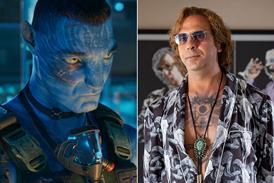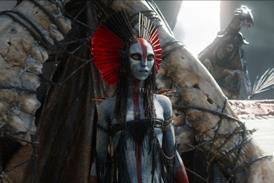- News
- Reviews
- Features
- Festivals
- Box Office
 ‘Avatar: Fire And Ash’ hits $760m at global box office after strong hold; Italy’s ‘Buen Camino’ delivers Christmas smash
‘Avatar: Fire And Ash’ hits $760m at global box office after strong hold; Italy’s ‘Buen Camino’ delivers Christmas smash UK-Ireland box office preview: ‘The Housemaid’, ‘The SpongeBob Movie: Search For SquarePants’ lead festive releases
UK-Ireland box office preview: ‘The Housemaid’, ‘The SpongeBob Movie: Search For SquarePants’ lead festive releases ‘Avatar: Fire And Ash’ heats up UK-Ireland box office with £9m opening
‘Avatar: Fire And Ash’ heats up UK-Ireland box office with £9m opening
- Awards
 How Amanda Seyfried overcame her fears to star in musical biopic ‘The Testament Of Ann Lee’
How Amanda Seyfried overcame her fears to star in musical biopic ‘The Testament Of Ann Lee’ In Conversation: ‘Wicked: For Good’ director Jon M Chu and star Cynthia Erivo on favourite memories, ‘The Wizard Of Oz’ obsessions and homemade soup
In Conversation: ‘Wicked: For Good’ director Jon M Chu and star Cynthia Erivo on favourite memories, ‘The Wizard Of Oz’ obsessions and homemade soup Bafta flashback: ‘Man On Wire’ duo James Marsh and Simon Chinn on beating Danny Boyle and becoming Oscar favourites
Bafta flashback: ‘Man On Wire’ duo James Marsh and Simon Chinn on beating Danny Boyle and becoming Oscar favourites
- Subscribe

Subscribe to Screen International
- Monthly print editions
- Awards season weeklies
- Stars of Tomorrow and exclusive supplements
- Over 16 years of archived content
- Global production
Brian Tyler, composer, Thor: The Dark World
By Elbert Wyche2013-11-18T12:18:00

Composer Brian Tyler talks to ELBERT WYCHE about his musical process and how scoring Thor: The Dark World was a dream come true.
SIGN IN if you have an account
Do you want to keep reading?
Register for free access to five articles a month

Subscribe today and unlock access to:
- Unlimited film & TV news, reviews and analysis on Screendaily.com
- All print and/or digital editions of Screen magazine
- Breaking news alerts sent straight to your inbox
- Digital festival and market dailies
- Weekly awards magazines
Access premium content Subscribe today
If you have an account you can SIGN IN now
Subscribe to Screen International
Screen International is the essential resource for the international film industry. Subscribe now for monthly editions, awards season weeklies, access to the Screen International archive and supplements including Stars of Tomorrow and World of Locations.
Find out moreSite powered by Webvision Cloud











